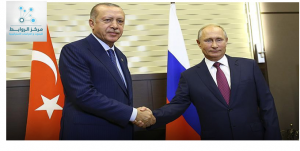Dr.Salim M.Al Zanoon
The announcement by Presidents Putin and Erdogan about the Sochi agreement on the establishment of a demilitarized zone in Idlib comes , after Damascus, Moscow and Tehran prepared recently to launch a large attack on Idlib, and it is considered a change in Moscow’s position during the Tehran summit based on rejecting Erdogan’s proposal for a truce in Idlib , and this change comes as a result of a new Russian reading on the Syrian scene prompted to re-calculate its calculations and make a different view , this reading is based on three main pillars :
1. Moscow’s desire not to collapse the agreement “Astana”, which is a substitute for the Geneva negotiations, especially in view of the position submitted by the five countries (America, Saudi Arabia, Jordan, France and Britain) to resolve in Syria according to the Geneva track, and the four-meeting in Ankara with the participation of France, Germany and Russia.
2. Maintain the relationship with Turkey at least for now, , as a military campaign inevitably leads to friction with Turkish forces in Idlib through 12 military positions.
3. Avoid collisions with US forces located east of the Euphrates in an alliance with Kurdish and Arab forces, and at a base near the border with Jordan and Iraq.
Turkish gains.
Ankara successfully managed to remove a possible military operation against Idlib, which had a negative impact on it. It succeeded in ending the risk of a new wave of refugees flowing into its territory and thus maintaining the agreement signed with the European Union in 2016 to prevent immigration to Europe. Ending the threat of potential security threats as a result of a military operation that inevitably leads to the friction of the forces of the Syrian regime and its allies with the Turkish forces deployed in 12 control points in Idlib, in the same context laying the groundwork and creating the environment to prevent the establishment of an independent Kurdish region on the northern border of Syria and southern Turkey.
Russian gains.
Moscow has succeeded in achieving maximum political gains without engaging in a bloody military operation that has repercussions on the international and humanitarian levels. In addition, the buffer zone, if implemented, will ensure the removal of the threat of unmanned aircraft from the Hameimim base where it suffered much from it recently, as well as to ensure stability of the Syrian regime. The buffer zone reduces if it does not prevent attacks on the Syrian regime forces in Homs, Hama and Lattakia. In this context, the file of the extremist organizations was transferred to Turkey in all its complexity and placed them before a difficult task to dismantle and withdraw its heavy weapons.
Challenges of implementation of the Agreement.
1. How to distinguish between extremist and moderate organizations , this is a dilemma that Turkey has not been able to solve yet, because trying to separate them and eliminate extremist regimes is very difficult.
2. Turkey faces a very difficult task in how to control and dismantle the Sham Liberation Organization, the Nasra Front and al-Qaeda-linked organizations (Al Badia Army, Al-Malahim Army, and Turkmen Islamic Party) and ISIS organization.
3. Idlib is considered the last resort of extremist organizations in Syria. It is therefore expected that these organizations will reject an agreement that would ban them and dismantle them before the regime, and therefore the possibility of carrying out operations against the Russian-Turkish forces is very forthcoming.
The agreement does not mean that Idlib is completely avoiding the military option. The parties may find themselves forced to carry out a military operation to implement the disarmament process in the buffer zone from the extremist organizations. This agreement will only contribute to stabilizing the situation in Idlib for a few months.
Rawabet Center for Research and Strategic Studies

